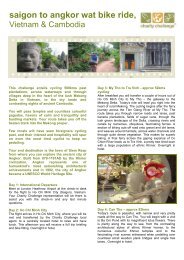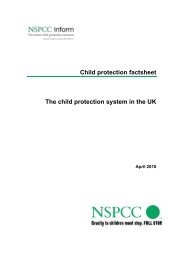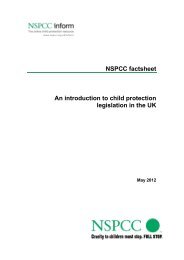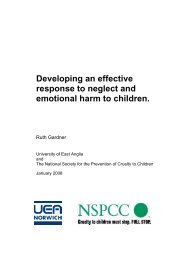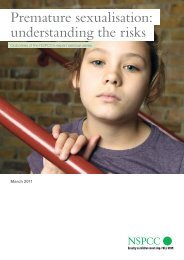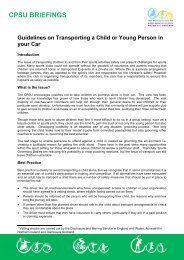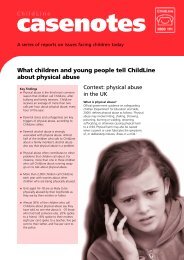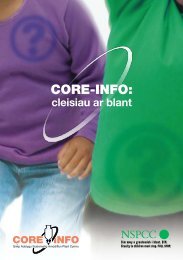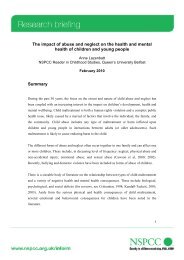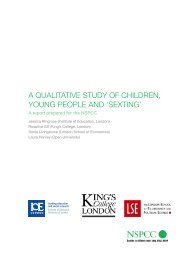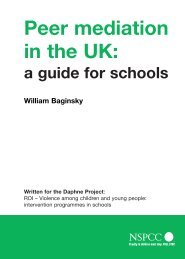Neglect and serious case reviews (PDF, 735KB) - nspcc
Neglect and serious case reviews (PDF, 735KB) - nspcc
Neglect and serious case reviews (PDF, 735KB) - nspcc
Create successful ePaper yourself
Turn your PDF publications into a flip-book with our unique Google optimized e-Paper software.
event prompting the Serious <strong>case</strong> review:<br />
The baby’s post mortem revealed numerous fractures in addition to the<br />
head injury which caused the death.<br />
background to the family <strong>and</strong> <strong>case</strong>:<br />
The family of two children (the older sibling was aged five) moved house<br />
regularly <strong>and</strong> had only been in the new area for three months. Parents were<br />
reluctant to provide information about themselves <strong>and</strong> their children but it<br />
was gradually discovered that both parents had a number of convictions,<br />
including for drugs <strong>and</strong> violence. The family appeared self-contained <strong>and</strong><br />
socially isolated with no contact with family or other friends <strong>and</strong> no social<br />
supports. The mother was the dominant parent <strong>and</strong> was suspicious of<br />
professionals, hostile <strong>and</strong> resistant to advice. Her history was known to be<br />
difficult but she would not divulge any information about her past. The<br />
father was the children’s main carer <strong>and</strong> his past included drugs related<br />
offences including for violence. He worked from home. His partner took the<br />
lead in any interactions with helping agencies, while he appeared quiet <strong>and</strong><br />
mild mannered. The mother had a job outside the home but also worked<br />
from home <strong>and</strong> was the major earner.<br />
types of neglect experienced:<br />
3. A thematic analysis of neglect<br />
There was very little ante natal care <strong>and</strong> the pregnancy was not notified<br />
until six months gestation. Although booked into hospital, Evie’s mother<br />
gave birth to the baby at home with no medical attendance (as had been<br />
the <strong>case</strong> with the birth of the older sibling). Evie was born healthy <strong>and</strong> her<br />
early care was said to be ‘good’. Her parents would not allow her to receive<br />
any immunisations <strong>and</strong> took her to the 6 week check with the GP with<br />
some reluctance. After this first check, all appointments <strong>and</strong> immunisations<br />
were missed. No health professional saw Evie after the age of 6 weeks.<br />
Evie’s sister had been found crawling outside unattended by a health<br />
professional when she was nine months old. At the age of two years<br />
Evie’s sister was described as ‘desperate for attention’. Later, at school,<br />
the sister was said to not know how to play <strong>and</strong> appeared ‘resigned’ <strong>and</strong><br />
‘measured’ but was always compliant, presenting as charming <strong>and</strong> smiling,<br />
but occasionally rocked in a foetal position. She sometimes came to school<br />
without any lunch <strong>and</strong> without a coat in cold weather. Concerns about<br />
emotional neglect were prompted by her behaviour at school.<br />
Conditions at home during Evie’s life were disorganised <strong>and</strong> cluttered but<br />
not poor. There were no toys visible in the home. When Evie was three<br />
months old a female relative expressed concern to children’s social care<br />
about the family’s social isolation, the lack of toys <strong>and</strong> the lack of any<br />
stimulation for the children at home.<br />
65



